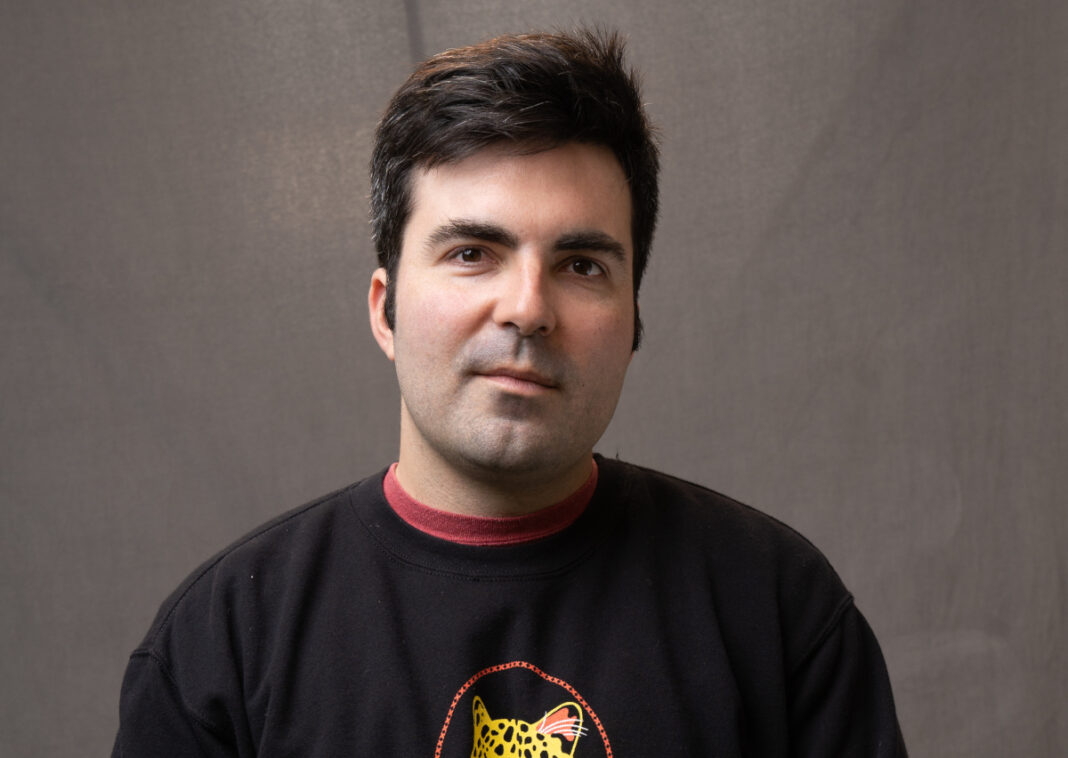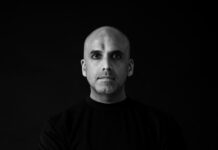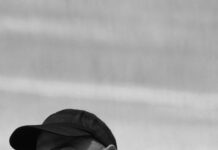
Photo: Press (Alex Burkat)
It is perhaps not entirely true that slow and steady always wins the race, but if you find your own pace, that is certainly a gigantic feat. Alex Burkat has obviously managed to do exactly that. Starting out as Pfunkt, the Philadelphia-born DJ started releasing a slew of records in the early 2010s on labels such as 100% Silk, Mister Saturday Night, Permanent Vacation, and Third Ear as well The Nite Owl Diner, the imprint he ran with Chrissy. And while he recently also debuted on a new label co-founded by him, Only Child, he has started dedicating more time to the Philadelphia community after he relocated to the city after a few years of living in New York City, trying to unite and document the scene with his Ancient Puzzle Arts events and podcast series. Burkat’s contribution to our Groove podcast was inspired by a recent visit to Berlin and full of gems from city’s rich history of electronic music, but presented in true Philly style.
You have been producing music since you were a teenager. What initially drew you to electronic dance music and what exactly did your attempts at making music sound like?
I once saw a hypnotist a while ago. He helped me find my earliest, happiest memory—witnessing my dad DJ at a pool party in Ocean City, New Jersey. I was eight years old and I remember he was playing “Turn the Beat Around” by Gloria Estefan. I feel like that memory alone has sparked my life-long love of dance music. Along with that, a music promotions company called R5 Productions in Philadelphia hosted a lot of incredible electronic artists in a church basement in the early 2000s. I think the experience of seeing TV On The Radio, Prefuse 73, RJD2, Kid606 and Múm in a church basement specifically inspired me to explore the range of possibilities with electronic music.
Looking at your back catalogue, it’s almost as if the EPs The 285 Kent, named after a famous and now-defunct Brooklyn underground venue, Pay the Rent and The Last Days of Flatbush tell a story of the effects gentrification had on New York City and its culture. What impact did living in that city have on you personally and as a DJ and musician?
I have a very bittersweet relationship with New York City. It certainly lives up to the hype in terms of “the city that never sleeps” and “if you can make it in here, you can make it anywhere.” I don’t think I understood house and disco culture until I lived in NYC, especially until I went to the Loft and early Mister Saturday Night parties at 12turn13. Those memories still influence me today. I also loved the Brooklyn techno culture at the time, with 285 Kent and Bossa Nova Civic Club, which is still around today, being great epicenters for inspiration. Unfortunately, I was dealing with mental health issues around 2014, which required me to regroup in my hometown of Philadelphia. Though intoxicating and inspiring, NYC certainly accelerated my mental health issues. I think it’s a great place to explore grandiose ideas, but I personally cannot live there anymore. As a consumer of dance music culture, it’s undeniably fantastic. But as an artist, I feel this unhealthy competition and dog-eat-dog mentality throughout the Five Boroughs, especially in comparison to other smaller cities like Detroit and Philadelphia that are more collaborative, smaller scale, and DIY-focused.
How was it coming back to Philadelphia?
Between 2014 and 2018, I had to regroup and handle some personal issues if I wanted to live a healthy life in my 30s and beyond. 2019 to today—with the pandemic in between—was more of my “welcome home” years, where I saw myself as a Philadelphia creative rather than a guy who couldn’t make it in NYC. I see Philadelphia as a distinctly vibrant place, and I have more intimate relationships with creative people here in Philly than during my artist-hustler life in NYC. These days, I prefer a more intimate environment as my home, and I travel to do out-of-town gigs if I want bigger scale excitement.
How would you describe the local scene’s status quo today? In the past, you have praised the city for teaching you “things don’t have to be divided” culturally.
A lot has changed in the Philadelphia music scene—for the better, in my opinion. There was a transition point at one time where there weren’t enough quality underground parties, and the EDM festival bubble at that time was rather annoying. Now with the pandemic subsiding, I think people really want to dance these days, and there are great house, techno, and electronic options pretty much every night of the week if you know where to look. For house, my favorites are Dan Edwards’ Sonic Garden, Rob Paine and Francisco Collazo’s Goodie, John Raffaele and Keen’s Subsurface, Elvin T’s void, and the Solar Sounds events hosted by Riva & Bianca and Sara Golden. There’s also Joshua Lang events and DJ Matpat’s Club Congress. And of course, the King of Transcendence, who has been doing it big in Philly for forever: Making Time with Dave P! His annual Fort Mifflin festivals have internationally acclaimed line-ups. In terms of other electronic events, Great Circles‘ ambient series Passages is really well curated. All of these events are totally my vibe, with diverse audiences, excellent music, affordable entry, and unique venues… I gravitate towards these types of parties over the hyper-stimulation overload of festivals, especially of the EDM variety.
With Ancient Puzzle Arts, you run a podcast and event series in Philadelphia. What was your motivation to start them and how do you go about programming the events?
Ancient Puzzle Arts originally started as a 12 hour, totally nuts loft party in Brooklyn with friends I’m still close with today. That legendary night led to an expansive self-expressive direction for me. Before then I was mostly emulating my idols, to be honest, and that night I was like, “You know what? I’m really doing my own thing here.” So that night led to the confidence to do things my own way, to play the music you want to hear, and to an audience who really connects with it. You have to do it yourself. The party series was very sporadic up until 2019 when I finally committed to doing a residency at a venue, the legendary Philadelphia spot Silk City (which is actually the alias of a Diplo and Mark Ronson project). Lots of my DJ idols—Rob Paine, Rich Medina, Josh Wink, King Britt, among others—had nights at Silk City, so I aspired to get closer to their level as a DJ and event host. I think the consistency and having to run everything myself really upgraded my DJ skills and accelerated what would become “my sound” as a DJ and producer. I used to play a variety of different styles, but doing nights at Silk City forced me to develop an Ancient Puzzle Arts style of DJing. But then the pandemic happened… I was so used to connecting with Philadelphia creatives that I needed something community-oriented to stay sane during the lockdown. That’s when I launched the Ancient Puzzle Arts podcast series, which has been fairly successful. It has not only expanded my audience to cities all over the world, but it has also deepened my relationship with the DJs I really love. Now that we are (mostly) on the other side of the pandemic, a big motivation to continue to do the podcast series is to create a time capsule of what the Philadelphia local sound is at any given moment. Even just three years in, I look back at who I had on the podcast series, and I am blown away by how well it represented the time and culture then which continues to evolve today.
Your latest solo release as a producer was The Spiral Island, the inaugural record on the Only Child imprint. It’s a mostly beatless record. What was the idea behind it and what are your plans with Only Child?
From 2010-2014, I had a burst of creative output. I have been sporadically releasing music I made during that period, on and off, for almost seven years now. I still have two upcoming vinyl releases from that era. With The Spiral Island, I wanted to release a non-dance music electronic record, since there was no safe space for dancing at the time. The Spiral Island were the best of my home-listening tracks that were still unreleased. It was a really exciting project that I was fortunate enough to do with my close friend and creative partner, Ashish Shetty. We still have big plans with Only Child and future releases, but we are “quality over quantity” people, and are huge fans of physical mediums like vinyl and CD—which, as you probably know, are extremely time-consuming and laborious to produce. But the reward of having physical media of your art distributed to fellow music nerds like me all throughout the world makes all of the delayed schedules and hard work worth it.
Apart from that, you have released relatively few solo pieces or remixes in the past years. What role does producing music play in your life right now?
I made a ton of solo music from the ages of 16 to 35. It served as my therapy and primary form of self-expression for a very long time. These days, I am more career-focused in order to achieve personal life goals like buying a house one day and investing in larger scale creative projects. I feel like I have proven myself as a solo producer, and I also detest when solo producers get lazy and rely upon templates for their on-going creative output. That gets boring and stale. I want all of my releases to be unique and with a diversity of sound, but still fit within a consistent sonic lineage. As you can imagine, this is hard to pull off—and creating something that’s new and better than what I’ve already done takes a really long time, especially given my limited energy and time as an adult in my 30s—but it’s worth it to me. Also, in my 20s, I used to edit videos all day at work, go on the NYC subway, and immediately go home and produce in front of a computer until 3 a.m. There’s no way I can do that anymore! I value my health—physical, mental and spiritual—too much to burn myself out like that anymore. Finally, working with a variety of different studios is both exciting and challenging, and it keeps it fun for me. My Throne of Blood Recordings record with Zillas on Acid was all done at RECPhilly in Philadelphia, and my new production is all made in Dan Edwards’ studio. I am currently experimenting with analog gear—cliché, I know—so that is adding even more excitement!
Besides Zillas On Acid, you have also teamed up with Khésis in recent times. What draws you to working with others?
As I mentioned earlier, working in front of a computer by myself, after working 40 hours a week in front of a computer Monday through Friday, is just not appealing to me at the moment. I don’t even have a home studio. It’s like a gym membership, it forces me to go out and explore other opportunities. I also like ad hoc production with existing equipment in any studio, which forces you to use your Original Mind, as Won Buddhists describe. In the case of both Khésis (now known as Kin Teal) and Zillas on Acid, those productions were developed remotely over the pandemic. I am a big fan of Rick Rubin, and he always encourages thinking outside the box in terms of what results in the best product. Oftentimes there are good friends of yours who may have better skill sets and ideas than you for a given piece of work, so why not work with them? It’s a win-win situation, and it’s usually more fun this way anyway. I tend to make the most of every single composing studio session I do, especially if I’m paying for studio time. Oftentimes, when you’re using a rented studio space, you’re not likely to get the final result you want in a limited time, but you have some really fantastic sonic ideas that would not have been made had you not used that space. In these cases, I prefer to work with people who have home studios where they can take these great studio sessions across the finish line, and just finish the final details that require the production to be al dente.
You recorded your contribution to our Groove podcast after a trip to Berlin, your first since 2006, which you said inspired your mix. What brought you to Berlin and what kinds of experiences are you channeling through this mix?
Yes, as you mentioned, I hadn’t been to Berlin since 2006. I was studying abroad at the time, and I went to one of the old locations of Tresor. It only occurred to me years later how informative that night was on my artistic sound and identity, but techno was now spliced into my DNA. I wouldn’t even have an official house or techno release until 2013, but the impression of that night really stuck. I knew I owed it to myself to go back and revisit Berlin, which has transformed so much in the nearly two decades since I’d last been. Also, my dad, who was of German descent, recently passed away in April 2023. This Berlin trip was also a bittersweet way of honoring his memory, my German heritage, and the deep memory that influenced so much of my artistic expression over the last 17 years. Of course, I didn’t make it into Berghain during my visit, but I did get to meet and DJ right after Berghain resident Virginia at Refuge Worldwide, who is included in this mix. This particular mix is a fusion of the sounds I experienced in Berlin, mixed with my Ancient Puzzle Arts Philadelphia style of DJing. This hybrid vibe of Berlin and Philadelphia is something I hope to continue to cultivate over the coming years, and I hope more Ancient Puzzle Arts DJs make it to Berlin and back to do the same!
Last but not least: what are your plans for the future?
Since all of my answers to all of your questions were fairly verbose, I’ll make this one short: invest in community.
Stream: Alex Burkat – Groove Podcast 391
01. Coldcut – Music 4 No Musicians
02. Matias Aguayo – The Tiger
03. Fred P – Grand Design
04. Ryan Elliott x André Galluzzi – Fontane
05. Peace Division – Body & Soul
06. Alex Burkat and Rob Paine – Herbman
07. Dean Grenier – Sweet Dreams
08. Virginia – Funkert (Extended Version)
09. Claudio PRC – Haidou
10. Session Victim – Motivation (with Ras Stimulant)
11. Cassy, Pete Moss – You Gotta Know (Ron Trent Remix)
12. Radio Slave – Stay Out All Night (Kusp Remix)
13. Alex Burkat – Venom
14. Mike Huckaby – The Tresor Track
15. Sven Väth, Bart Skils, Weska – Metal Master – Spectrum (Bart Skils & Weska Reinterpretation)
16. Nightmares On Wax & Haile Supreme – Own Me




